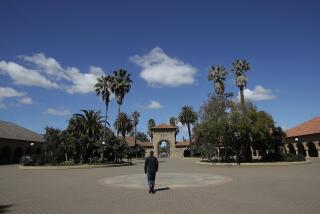Readers React: Require students to disclose if they had help with their college applications
- Share via
To the editor: If the goal of college admissions is to reward students on the basis of merit and self-dependence, not on the benefits of being wealthy, perhaps it’s time to level the playing field by requiring prospective students to disclose what kind of assistance they received in preparing their applications. (“The legal way the rich get their kids into elite colleges: Huge donations for years,” March 22.)
Each applicant could be evaluated and given a score that takes into account how much help they had with their application. Admissions officers would need to corroborate the validity of the information.
Upon verification, each applicant should be given a total score, reflecting high school transcripts, standardized test scores, assistance with applying to college and any other relevant measure. Having a high assistance score should not deny a student admission, but it should make it so applicants with lower scores benefit.
Something like this could bring parity to admissions policies that now favor students who can afford to pay for assistance over those who must rely only on their hard work and achievement.
Larry Naritomi, Monterey Park
..
To the editor: Amid the media scorn heaped upon the illegal behavior of coaches and conniving parents, what constitutes qualification for college entrance gets ignored.
According to admissions specialist Wil Del Pilar, ”We want kids to get in based upon the work they’ve put in.” From this, are we to assume that all it takes to get into a top college is to do well in a compulsory curriculum (including standardized testing) and show sufficient extracurricular experience?
What is needed is a litmus test to identify an applicant who can entertain an idea, another person and himself.
William K. Solberg, Los Angeles
..
To the editor: In following the college admissions cheating scandal, I remember a passage written by F. Scott Fitzgerald in “The Great Gatsby” about those granted wealth and privilege by birth. In other words, we’re seeing life imitate art:
“It was all very careless and confused. They were careless people, Tom and Daisy — they smashed up things and creatures and then retreated back into their money or their vast carelessness, or whatever it was that kept them together and let other people clean up the mess they had made.”
Frank McAdams, Dana Point
..
To the editor: In “A wiretap brings privilege and helicopter parenting to the fore in the college admissions scandal,” the parent of a Type 1 diabetic college student is held as an example of one of the worst type of helicopter parents because she tracks her daughter’s blood sugar levels on an app. The assumption is that the mother believes that her daughter cannot do “this seemingly basic task on her own.”
The stark reality for those with Type 1 diabetes is that every day and night is a life-or-death situation. A diabetic can slip into a coma caused by a low or a severely high blood sugar. So many factors play into the regulation of blood sugar by insulin injections that this delicate balance can easily go awry.
Diabetics of all ages benefit from loved ones assisting with monitoring, especially at night as they sleep. The analogy in the article is insulting and ignorant.
Cara Cea, Suffern, N.Y.
Follow the Opinion section on Twitter @latimesopinion and Facebook
More to Read
A cure for the common opinion
Get thought-provoking perspectives with our weekly newsletter.
You may occasionally receive promotional content from the Los Angeles Times.









